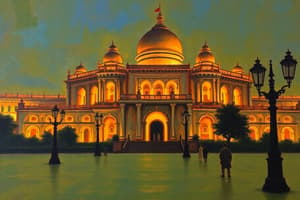Podcast
Questions and Answers
What is the minimum age requirement to be eligible to run for the Lok Sabha?
What is the minimum age requirement to be eligible to run for the Lok Sabha?
- 35 years
- 30 years
- 21 years
- 25 years (correct)
How often are Lok Sabha general elections held?
How often are Lok Sabha general elections held?
- Every five years (correct)
- Every four years
- Every year
- Every six years
Which voting system is used in the Lok Sabha elections?
Which voting system is used in the Lok Sabha elections?
- Single transferable vote
- First-past-the-post (correct)
- Proportional representation
- Alternative vote
Who conducts the Lok Sabha general elections?
Who conducts the Lok Sabha general elections?
What is the total number of seats in the Lok Sabha?
What is the total number of seats in the Lok Sabha?
Which act governs the legal framework of the Lok Sabha elections?
Which act governs the legal framework of the Lok Sabha elections?
What is a recent trend observed in Lok Sabha elections?
What is a recent trend observed in Lok Sabha elections?
In which stage of the election process do candidates promote their agendas?
In which stage of the election process do candidates promote their agendas?
Flashcards are hidden until you start studying
Study Notes
Lok Sabha General Election
-
Definition: The Lok Sabha general election is a nationwide electoral process in India to select Members of Parliament (MPs) for the Lok Sabha, the lower house of Parliament.
-
Frequency: Occurs every five years, unless called earlier.
-
Eligibility:
- Candidates must be Indian citizens.
- Minimum age is 25 years.
- Must not be disqualified under any law.
-
Electoral Process:
- Conducted by the Election Commission of India (ECI).
- Voting is done through electronic voting machines (EVMs).
- Voter eligibility requires being a registered citizen aged 18 or older.
-
Number of Seats: Lok Sabha consists of 543 elected seats.
-
Political Parties:
- Major national parties include the Bharatiya Janata Party (BJP), Indian National Congress (INC), and regional parties.
- Coalition governments are common due to the multi-party system.
-
Voting System:
- First-past-the-post system, where the candidate with the highest votes in a constituency wins.
-
Recent Trends:
- Increasing voter turnout over recent elections.
- Growing influence of social media in campaigning.
- Importance of caste and religion in voting behavior.
-
Major Issues:
- Economic development, unemployment, corruption, and national security often dominate election discourse.
- Regional issues can also play a significant role depending on the constituency.
-
Election Stages:
- Announcement of Elections: ECI announces the election schedule.
- Nomination of Candidates: Interested candidates file nomination papers.
- Campaigning: Political parties and candidates promote their agendas.
- Voting Day: Electors cast their votes.
- Counting of Votes: Votes are counted, and results are declared.
-
Voter Participation: Emphasis on increasing participation through awareness campaigns.
-
Legal Framework: Governed by the Representation of the People Act, 1951 and other relevant laws.
-
Challenges:
- Vote buying and electoral malpractice.
- Political violence and intimidation.
- Ensuring free and fair elections.
-
Significance: Determines the composition of the government and influences national policies and governance.
Lok Sabha General Election Overview
- A nationwide electoral process in India for selecting Members of Parliament (MPs) for the Lok Sabha, the lower house of Parliament.
- Takes place every five years, with the possibility of early elections.
Candidate Eligibility
- Candidates must be Indian citizens and at least 25 years old.
- Individuals must not be disqualified under any existing laws.
Electoral Process
- Managed by the Election Commission of India (ECI).
- Voting utilizes electronic voting machines (EVMs), enhancing the efficiency of the voting process.
- Voter eligibility requires registration and a minimum age of 18 years.
Composition and Political Landscape
- The Lok Sabha comprises 543 elected seats.
- Major political parties include the Bharatiya Janata Party (BJP), Indian National Congress (INC), and various regional parties.
- Coalition governments are frequently formed due to a multi-party system.
Voting System
- Operates on a first-past-the-post system, where the candidate with the most votes in a constituency wins.
Recent Trends in Elections
- Rising voter turnout in recent elections indicates increased public engagement.
- Social media plays a significant role in modern campaigning strategies.
- Caste and religion are critical factors influencing voting behavior.
Key Issues in Election Discourse
- Prominent topics include economic development, unemployment, corruption, and national security.
- Regional issues can significantly impact voter preferences based on local context.
Election Stages
- Announcement of Elections: Schedule is publicized by the ECI.
- Nomination of Candidates: Candidates submit their nomination papers.
- Campaigning: Political entities promote their agenda to the electorate.
- Voting Day: Registered voters cast their votes.
- Counting of Votes: Vote counts occur, leading to the announcement of results.
Voter Participation Efforts
- Focus on increasing voter participation through awareness and education campaigns.
Legal Framework
- Governed by the Representation of the People Act, 1951, along with additional relevant legislation.
Challenges in the Electoral Process
- Issues include vote buying and electoral malpractice, potentially undermining the integrity of elections.
- Political violence and intimidation are significant concerns.
- Key emphasis on ensuring elections are free and fair.
Significance of Lok Sabha Elections
- The outcomes shape the government structure, influencing national policies and governance.
Studying That Suits You
Use AI to generate personalized quizzes and flashcards to suit your learning preferences.




